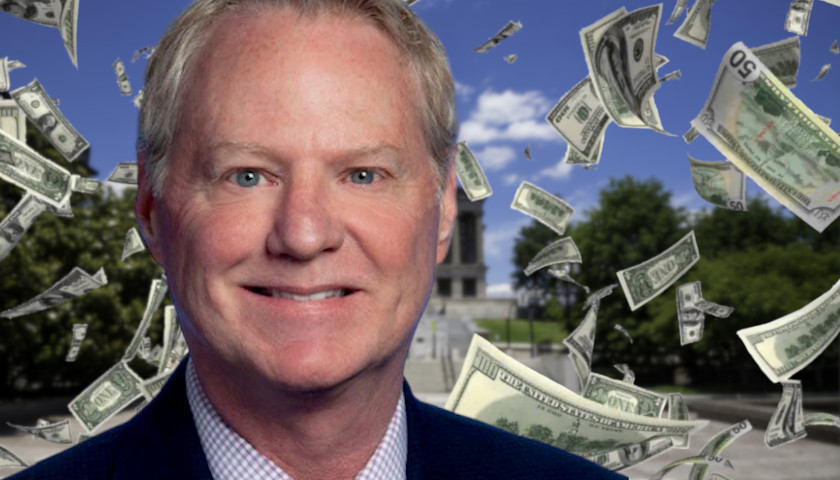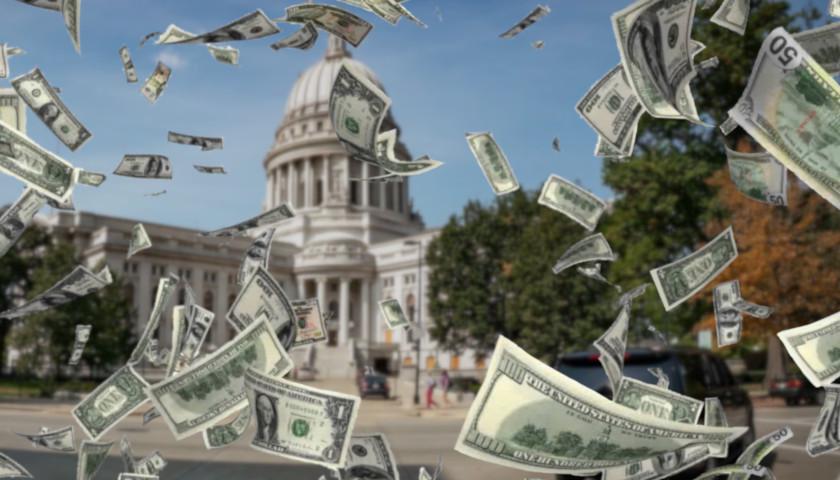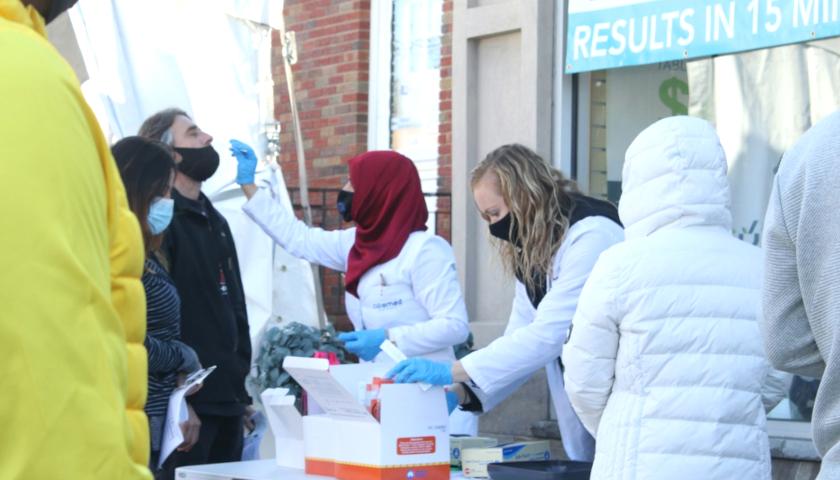Tennessee tax revenues for the month of July exceeded the budgeted estimate by $667.1 million, Tennessee Department of Finance and Administration Commissioner Butch Eley announced Thursday.
Overall revenues of $1.86 billion in July were $689.4 million more than state revenues in July 2019.
The higher-than-expected revenues for July has the state finishing the 2019-2020 fiscal year in a surplus position of $369.2 million against the budgeted estimate and 2.42 percent above last year, despite the impacts of the COVID-19 economic slowdown.
When taking into account the budget adjustments made during the 2020 legislative session due to the projected impacts of COVID-19, total state revenues are $488.2 million more than the revised revenue estimate, according to Eley.
The announcement comes on the heels of an American Legislative Exchange Council economic outlook ranking called Rich States, Poor States that put Tennessee 8th in the nation, The Tennessee Star reported.
Being a backward-looking measure on three variables ”highly influenced by state policy” – state gross domestic product, absolute domestic migration and non-farm payroll employment – Rich States, Poor States doesn’t take into account the impact of COVID-19.
Eley attributed the state’s positive revenue results to two factors.
“Tax revenue receipts for July recorded significant growth compared to the same month last year and greatly exceeded budgeted estimates because tax extensions made in March resulted in large tax payments being made in July,” Eley said.
“Sales and use taxes, which reflect June consumer sales activity,” Eley added, “revealed positive progress after three straight months of negative growth with federal stimulus assistance likely supporting a significant portion of Tennessee consumer spending.”
On an accrual basis, July is the final month in the 2019-2020 fiscal year and reported revenues will be subject to final accrual adjustments that may increase or decrease the recorded cash amounts on an audited basis, according to the announcement.
On an individual tax basis, it was a mixed bag of performance in actual revenues versus the budget for both the month of July and fiscal year 2019-2020.
In total, however, revenues for July were 56.09% ahead of the budget and 2.39% ahead for fiscal year 2019-2020.
Franchise & Excise – July $600 million against a budget of $79 million (+660.93%); FY 2019-2020 $2.8 billion against a budget of $2.6 billion (+8.75%)
Income – July $95 million against a budget of $469,000 (+20201.28%); FY 2019-2020 $151 million against a budget of $103 million (+46.04%)
Gasoline – July $72 million against a budget of $73 million (-0.90%); FY 2019-2020 $836 million against a budget of $873 million (-4.23%)
Petroleum Special – July $5.7 million against a budget of $6.1 million (-6.48%); FY 2019-2020 $67 million against a budget of $70 million (-4.72%)
Tobacco – July $22 million against a budget of $21 million (+4.92%); FY 2019-2020 $241 million against a budget of $241 million (+0.28%)
Beer – July $1.7 million against a budget of $1.5 million (+9.43%); FY 2019-2020 $18 million against a budget of $17 million (+4.86%)
Motor Vehicle Registration – July $34 million against a budget of $29 million (+17.72%); FY 2019-2020 $334 million against a budget of $340 million (-1.66%)
Motor Vehicle Title – July $2.1 million against a budget of $2.2 million (-4.64%); FY 2019-2020 $22 million against a budget of $26 million (-15.15%)
Mixed Drink – July $7.1 million against a budget of $13 million (-43.46%); FY 2019-2020 $116 million against a budget of $138 million (-16.13%)
Business – July $19 million against a budget of $9.3 million (+108.63%); FY 2019-2020 $229 million against a budget of $212 million (+8.26%)
Privilege – July $42 million against a budget of $36 million (+16.37%); FY 2019-2020 $441 million against a budget of $420 million (+5.05%)
Gross Receipts – July $13 million against a budget of $18 million (-28.40%); FY 2019-2020 $22 million against a budget of $26 million (-16.03%)
TVA In Lieu of Tax Payments – July $30 million against a budget of $29 million (+2.65%); FY 2019-2020 $368 million against a budget of $360 million (+2.34%)
Alcoholic Beverage – July $7.1 million against a budget of $6.8 million (+3.02%); FY 2019-2020 $77 million against a budget of $75 million (+3.41%)
Sales and Use – July $877 million against a budget of $837 million (+4.75%); FY 2019-2020 $9.7 billion against a budget of $9.6 billion (+1.00%)
Motor Vehicle Fuel – July $27 million against a budget of $27 million (+0.91%); FY 2019-2020 $313 million against a budget of $289 million (+8.17%)
Severance – July $3,000 against a budget of $61,000 (-95.08%); FY 2019-2020 $762,000 against a budget of $800,000 (-4.75%)
Coin-Operated Amusement – July $111,000 against a budget of $75,000 (+48.00%); FY 2019-2020 $26,000 against a budget of $0 (+36.50%)
At the conclusion of fiscal year 2019-2020 fiscal year, the four major funds are all ahead of the budget estimates.
General Fund – $13 billion against a budget of $12.7 billion (+2.61%)
Highway Fund – $1.02 billion against a budget of $1.0 billion (+1.57%)
Sinking Fund – $329 million against a budget of $329 million (+0.03%)
City & County Fund – $1.276 billion against a budget of $1.253 billion (+1.79%)
“Even as the state finishes the year with a positive revenue balance,” Eley cautions, “the impact of the COVID-19 pandemic on future revenues remains a concern. Thus, we will continue to monitor national and global economic indicators to manage our spending and revenue collections appropriately.”
Eley’s announcement includes the background on how the budgeted estimates were prepared and the history of adjustments in light of the anticipated COVID-19 economic impact.
The budgeted revenue estimates for 2019-2020 are based on the State Funding Board’s consensus recommendation of November 26, 2018, and adopted by the second session of the 111th General Assembly in April 2019. Also incorporated in the estimates are any changes in revenue enacted during the 2019 session of the General Assembly. These estimates are available on the state’s website.
On November 19, 2019, the State Funding Board met to hear updated revenue projections from various state economists. Following this meeting, on November 26, 2019, the board decided to adopt revised revenue growth ranges for the current fiscal year. The recurring growth ranges adopted include a low of 3.10 percent to a high of 3.60 percent for total taxes and a recurring range low of 3.20 percent to a high of 3.75 percent for general fund taxes.
On March 19, 2020 in the second session of the 111th General Assembly, the Legislature passed the 2019-2020 budget, which included the Funding Board’s current year revised ranges and the administration’s amendment to the proposed budget. To recognize the economic impact of the COVID-19 pandemic, the administration’s amendment included a reduction of $153.8 million of previously projected revenue to acknowledge potential shortfalls. The governor signed the appropriations bill on April 2, 2020 and it became Public Chapter 651, which still recognized an additional $396.1 million in total revenue and a corresponding increase in general fund revenue in the amount of $345.9 million for FY20.
In June, the General Assembly reconvened again and, due to the unforeseen economic impact of COVID-19, elected to lower revenues estimates further for the current fiscal year thereby reducing general fund estimates by $500 million. Consequently, a revised FY 2021 budget (Public Chapter 760) was signed into law on June 30, 2020.
The revenue tables for July and fiscal year 2019-2020 are available here.
– – –
Laura Baigert is a senior reporter at The Tennessee Star.









Hooray!!!! Raises for all Commissioners and Governor’s staff!!!!
Maybe politicians show now be figuring out how to lower taxes, rather than figuring out how to spend the extra money. Obviously, if there’s that much of a surplus, the taxes are too high.
Nope, our bozo mayor is still trying to shove a 34% property tax down the throats of Nashville’s citizens who are already struggling during the pandemic. It’s like he’s actually trying to destroy this city’s economy. We already have one of the highest sales tax rates in the nation.